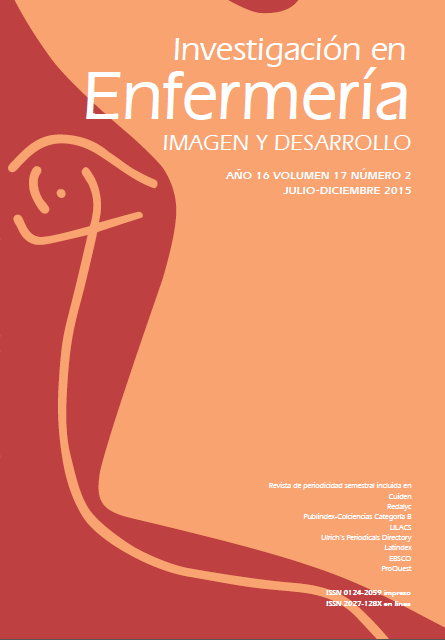Abstract
Introduction: informed consent (IC) is based on the bioethical principle of respect for autonomy. Its usefulness in acts of care often is more related to administrative and even legal aspects and overpowers the ethical vision in which the nurse-patient relationship is based. It is inherent to care practices and poses a challenge to the ethical and humanistic development of the discipline. Objective: To identify the knowledge and
importance nursing students have about the IC applied to the acts of nursing care, by applying the theory of nursing's fundamental patterns of knowing. Methodology: A descriptive, cross quantitative study with a sample of 184 students and self-designed instrument; Likert-type scale with 40 items distributed on the variables: knowledge and importance of IC. The validation of the instrument was carried out through a content
validation by expert judgment, evaluation of metric properties using Cronbach's alpha (coefficient of 0.838) and pilot test with 21 students. For the data analysis we used the SPSS software (Ver. 22.0.0) and the information was presented in scatterplot matrix diagrams; history of clustering and dendrograms, using cluster analysis type. Results: There were no differences in values between men and women. The developed
cluster typologies produced four taxonomical categories in the IC conceptualization. Conclusion: With the support of the theory of nursing's fundamental patterns of knowing, the most favored patterns and the ones that are poorly developed were determined. Little importance is given to the written document, and more relevance
is given to the process of providing information in performing acts of care.
The journal Investigación en Enfermería: Imagen y Desarrollo is registered under a Creative Commons Attribution 4.0 International Public License. Thus, this work may be reproduced, distributed, and publicly shared in digital format, as long as the names of the authors and Pontificia Universidad Javeriana are acknowledged. Others are allowed to quote, adapt, transform, auto-archive, republish, and create based on this material, for any purpose (even commercial ones), provided the authorship is duly acknowledged, a link to the original work is provided, and it is specified if changes have been made. Pontificia Universidad Javeriana does not hold the rights of published works and the authors are solely responsible for the contents of their works; they keep the moral, intellectual, privacy, and publicity rights.
Approving the intervention of the work (review, copy-editing, translation, layout) and the following outreach, are granted through an use license and not through an assignment of rights. This means the journal and Pontificia Universidad Javeriana cannot be held responsible for any ethical malpractice by the authors. As a consequence of the protection granted by the use license, the journal is not required to publish recantations or modify information already published, unless the errata stems from the editorial management process. Publishing contents in this journal does not generate royalties for contributors.


